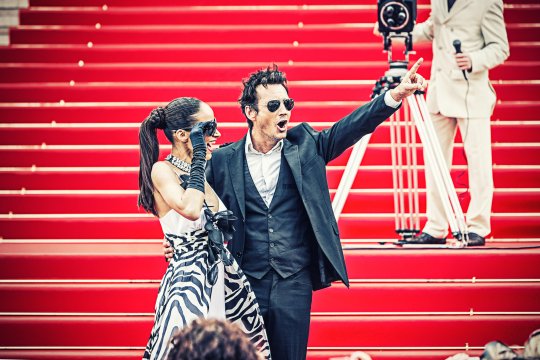Celebrity: The Fascination, Power, and Influence in Modern Society

Introduction to the World of Celebrities
The term “celebrity” instantly brings to mind images of red carpets, flashing cameras, and the buzz of media attention. Celebrities can be actors, musicians, athletes, social media influencers, or even business moguls who have captured the public’s attention. The defining characteristic of a celebrity isn’t just talent—it’s visibility. They are known by large groups of people, often across different countries, and their personal lives, careers, and even opinions can influence millions.
In today’s fast-paced digital age, the concept of a celebrity has evolved dramatically. A few decades ago, fame was mainly reserved for individuals who appeared on television, in films, or on the radio. Now, with platforms like YouTube, TikTok, and Instagram, ordinary individuals can gain celebrity status overnight. This democratization of fame has blurred the lines between traditional stars and internet-born influencers, making the celebrity landscape richer and more diverse than ever.
While fame brings admiration and opportunities, it also brings intense public scrutiny. Being a celebrity is no longer just about performing—it’s about managing an image, engaging with fans, and navigating an ever-curious media landscape. For better or worse, celebrities have become a constant presence in our daily lives, shaping entertainment, culture, and even politics.
The Rise of Modern-Day Celebrities

Celebrity Gone are the days when only actors and musicians held the spotlight. Today, reality TV stars, social media personalities, and even viral meme creators can claim celebrity status. This shift began in the early 2000s, fueled by shows like American Idol, Big Brother, and Keeping Up with the Kardashians, which offered a behind-the-scenes look into personal lives. Viewers developed emotional connections to these personalities, propelling them into stardom.
Social media has been the ultimate game-changer. Platforms like Instagram and TikTok give celebrities direct access to their audiences without needing traditional media. It has also given rise to a new kind of fame—micro-celebrities—who may not have millions of followers but still enjoy loyal fan bases within specific niches. This has allowed people from diverse backgrounds to gain recognition, making fame more accessible than ever.
Interestingly, the path to becoming a celebrity today often requires a mix of talent, relatability, and savvy marketing. A viral dance, a trending tweet, or a YouTube video can be the spark that ignites a career. In this new age, the audience plays an active role in creating celebrities, deciding who becomes famous and how long they stay in the spotlight.
The Influence of Celebrity Culture
Celebrities don’t just entertain; they influence trends, lifestyles, and even social movements. Their fashion choices can sell out clothing lines in hours. Their fitness routines inspire millions to hit the gym. Their endorsements can make or break a brand’s reputation. This influence extends far beyond the realm of entertainment—it has a real impact on economies and cultures.
One striking example is the way celebrities drive consumer behavior. When a star endorses a product on Instagram, it can lead to a measurable spike in sales almost instantly. This is why brands are willing to invest millions in securing celebrity endorsements. Celebrities have the power to shape public perception, not only of products but also of ideas and values.
However, this influence comes with responsibility. Many celebrities use their platforms to raise awareness about important issues such as climate change, racial equality, and mental health. While some critics argue that celebrities should “stay in their lane,” their ability to reach massive audiences makes them powerful voices for change. When used wisely, celebrity influence can be a force for good.
The Dark Side of Fame
While fame brings wealth, opportunities, and admiration, it also carries a heavy price. Celebrities often live under a microscope, with every move analyzed by fans, tabloids, and social media users. The pressure to maintain a perfect image can lead to mental health struggles, burnout, and a sense of isolation.
The invasion of privacy is one of the most challenging aspects of celebrity life. Paparazzi, gossip websites, and relentless fan speculation mean that celebrities rarely get a moment to themselves. Even their families are often dragged into the spotlight, sometimes unwillingly. This constant scrutiny can make it difficult for celebrities to maintain normal relationships and live a balanced life.
Moreover, the rapid rise to fame can be overwhelming. Some celebrities struggle to adjust to their newfound status, leading to issues like substance abuse or public breakdowns. While the public is quick to celebrate the highs, it can be equally quick to criticize or abandon stars during their lows. This rollercoaster dynamic is one of the most emotionally taxing aspects of being a public figure.
Why We’re Fascinated by Celebrities
Our fascination with celebrities goes beyond their talent—it’s deeply rooted in human psychology. People are naturally curious about the lives of others, especially those who seem to live in a different world. Celebrities represent a kind of fantasy life—filled with luxury, glamour, and adventure—that many people find captivating.
There’s also the relatability factor. Despite their wealth and fame, celebrities often share experiences that mirror our own—heartbreak, family struggles, personal achievements. Seeing these shared experiences in someone who seems larger than life creates a strange but compelling connection. This parasocial relationship allows fans to feel personally invested in a celebrity’s journey.
On a cultural level, celebrities often serve as symbols of aspiration. They embody ideals of beauty, success, and creativity that people strive toward. Whether we admire them, criticize them, or simply follow their lives out of curiosity, celebrities hold a mirror to society’s values and ambitions.
The Future of Celebrity
The definition of “celebrity” will continue to evolve as technology and media change. In the future, we can expect to see even more diversity in the types of people who gain fame. Virtual influencers, AI-generated personalities, and even ordinary people who go viral for a single moment will all be part of the celebrity landscape.
With the rise of the metaverse and immersive online experiences, fans may be able to interact with celebrities in entirely new ways—attending virtual concerts, meeting them in digital spaces, or even collaborating with them on creative projects. This could further blur the line between celebrity and fan, making the connection more personal than ever.
However, the challenges of fame will remain. Privacy concerns, media pressure, and the risk of public backlash will still be part of the equation. The celebrities who thrive in the future will be those who can adapt to changing platforms while staying authentic to themselves.
Conclusion
Celebrities hold a unique place in society, acting as entertainers, trendsetters, and sometimes even agents of social change. While the path to fame has become more accessible in the digital era, the realities of celebrity life remain complex, filled with both rewards and challenges. Our fascination with them reflects not only our interest in glamour but also our desire to connect with stories of success, struggle, and human experience.
In the end, celebrities are both extraordinary and relatable—people who live in the spotlight but face the same emotions and challenges as the rest of us. As long as humans are curious and inspired by others, the phenomenon of celebrity will remain a powerful and enduring part of our culture.



